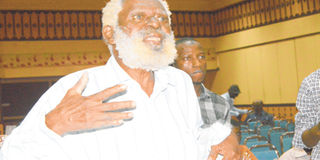Herbalists divided on govt's order on advertising

A participant at yesterday’s meeting in Dar es Salaam to discuss the government’s ban on advertisements by traditional healers and alternative medicine practitioners, presents his views. PHOTO | OMAR FUNGO
What you need to know:
The meeting, which was attended by about 100 herbalists from five regions, overshot the scheduled timeframe in the wake of controversial discussions among clearly rival camps.
Dar es Salaam. Herbalists across the country yesterday rejected the government’s ban on all public advertisements of herbal medicine, at a dramatic meeting held in Dar es Salaam.
The meeting, which was attended by about 100 herbalists from five regions, overshot the scheduled timeframe in the wake of controversial discussions among clearly rival camps.
At one point, journalists were forced out of the meeting room and asked to return after an unanimous decision had been reached. However, even when the journalists were allowed back, no compromise had been struck.
Herbalists who called for the government directive to be treated cautiously and respectfully were opposed by colleagues who called on the government to revisit the laws and regulations which guided traditional healers and alternative health practitioners.
A volunteer from the Traditional Medicine and Environmental Protection Organization (Tramepro), Ms Hilda Kiwasila, recited the Act of Parliament on traditional medicine passed in 2002, to refresh the memories of the participants.
She stressed that, the Ministry of Health, Community Development, Gender, Children and the Elderly should have held a roundtable meeting with the herbalists to brainstorm on the way forward, instead of making rushed decisions.
“The government collects revenue from the adverts that you see on the streets and on some billboards. So, are we the only ones supposed to stop this business of advertising or the municipal authorities too? What about media outlets that have signed contracts with the advertisers?” queried Ms Kiwasila.
Another herbalist, Ms Rahabu Lubago, lamented the loss of about Sh8million in a contract that she had signed with a local television station to advertise herbs that purportedly cure stomach ulcers.
“This is very unfair,’’ said Ms Lubago, previously a professional secretary. She added: “If the government discovered that one herbal clinic was violating regulations, why should the decision cover all of us? She queried.
Ms Lubago was, however, at peace with the government’s plan for a major crackdown on unethical traditional healers and alternative health practitioners. ‘’It’s okay if the government detects problems in what we do, but the laws must be followed,” she told The Citizen on the sidelines of the meeting.
The chairman of the meeting, Mr Sultan Tamba, tried in vain to calm herbalists who were visibly disappointed by the government’s directive.
However, the meeting was adjourned until further notice.
“We have heard all that the members of the meeting have discussed and we[leaders of the meeting]will see how to represent the summary to the relevant authorities. But we might convene another meeting to discuss the issue afresh until we chart the way forward,’’ said Mr Tamba.
Some of those who described themselves as qualified alternative medicine practitioners said they were undermined by being made to share a platform with traditional healers and witchdoctors. Ms Elizabeth Lema, from a clinic known as CornWell Tanzania, told The Citizen that the government has not set laws to categorise the practitioners, something she said was a source of friction.
In an exclusive interview recently, a professor of traditional Medicine at Muhimbili University of Health and Allied Sciences (Muhas), Prof Rogassian Mahunnah, said that alternative medicine means the use of herbal medicine which is imported, in trying to offer unconventional health services, as long as it is recognised by relevant authorities.
But, he added, “Traditional medicine is the one that is strictly originating from the indigenous class of Tanzanians and recognised by the Alternative Health Practices Council of Tanzania.” The Deputy Minister for Health, Community Development, Gender, Children and the Elderly, Dr Hamis Kigwangala, recently made an impromptu visit to one herbal clinic, owned by a popular herbalist Juma Mwaka, and asked him to submit his operating licence.
The minster’s decision triggered a public outcry and backlash. However, in an apparent response, the Health ministry banned all the advertising of herbs by traditional healers and alternative health practitioners.
Highlights of the ministry’s directive include an inspection of all the herbs offered by traditional healers and alternative health practitioners, as well as the machines for conducting diagnosis.



